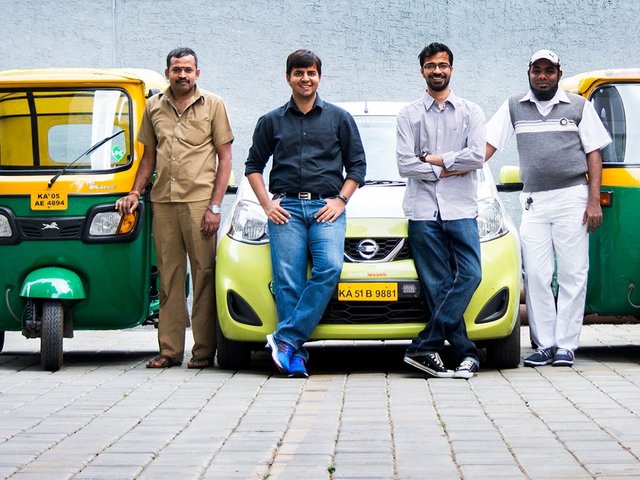Uber rival Ola buys Foodpanda India to get into food deliveries

Ola, the Uber rival in India, is entering the food delivery space after it announced a deal to acquire Foodpanda’s India business from its parent company DeliveryHero.
The deal will see Ola scoop up the Foodpanda India business with DeliveryHero taking an undisclosed amount of Ola stock in exchange.
Undisclosed all-stock deals are usually indicative of a willingness to sell, and we have heard that DeliveryHero has been shopping its Indian business around. Further: Saurabh Kochhar, who headed Foodpanda India, has also “decided to move on to pursue other opportunities,” according to today’s announcement. Ola founding partner will interim CEO until a permanent replacement is found.
Nonetheless, Ola — which is now at around two million rides per day — is an ideal buyer.
The company is in the mood for expansion after it closed a $1.1 billion funding round led by Tencent and SoftBank in October, and seeking ways to differentiate itself from Uber’s Indian business.
To help kickstart that, Ola is pumping $200 million into Foodpanda India, which claims 12,000 restaurant partners in over 100 cities. That investment is more capital than Foodpanda’s (many) competitors in India have raised to date, as Ola went to great pains to point out. But still there’s a great challenge ahead.
DeliveryHero acquired Foodpanda from Rocket Internet at the end of last year, primarily to extend its food-ordering business into Asia, the Middle East and parts of Eastern Europe where Foodpanda is present. Delivery Hero went public this summer at a valuation of $5 billion — giving Rocket Internet an unlikely exit for Foodpanda — which makes this sell-off all the more interesting.
Foodpanda hasn’t taken off in India as quite intended. The company ran into issues with operations — including fake listings and unreliable deliveries — while it laid off 300 staff at the end of 2015.
The company doesn’t disclose country-specific business figures, but order numbers from “Asia” — which includes India and Southeast Asia — grew 47 percent year-on-year in the recent Q3 2017 period to catch up with Europe. Revenue from Asia, however, remains behind at €35.5 million compared to €48.6 million in Europe and €41.8 million in the Middle East.
Without being specific to India, the Delivery Hero deal has generally been seen to inject positive change to Foodpanda’s business as a whole but the company is up against some deep competition.
Swiggy is backed by Naspers and raised near-to $100 million this past year, Zomato scaled to reach profitability and expanded into logistics while international giants Uber (UberEats) and Google (Aero) entered the space with initially limited services.
Foodpanda isn’t Ola’s first move into food. A previous dalliance — pilot project Ola Cafe — shut down in 2016 less than a year after operating in a handful of tier-one cities.
The difference this time, a source close to Ola told TechCrunch, is that Ola is buying a business with scale and not starting one from scratch.
Indeed, we understand that there is no initial plan to bring Foodpanda ordering into the Ola app. That could be a learning from the past — Ola Cafe operated inside the app with no standalone option — but also it is true to say that better engagement comes from a standalone app. There are plans to cross-promote the two services, but Ola isn’t giving details on that right now.
Likewise, while it said that Foodpanda India will “benefit from Ola’s scale and efficiencies as a platform,” it isn’t saying exactly what that will entail? Shared fleets/drivers, cross-marketing activities? It’s unclear right now.
What we do know with more certainty is that Ola just entered another dog-fight — because I guess battling Uber isn’t enough.
this photo is so creative
owo so creative
Thanks mate!
@originalworks
The @OriginalWorks bot has determined this post by @abhisheksurela to be original material and upvoted it!
To call @OriginalWorks, simply reply to any post with @originalworks or !originalworks in your message!